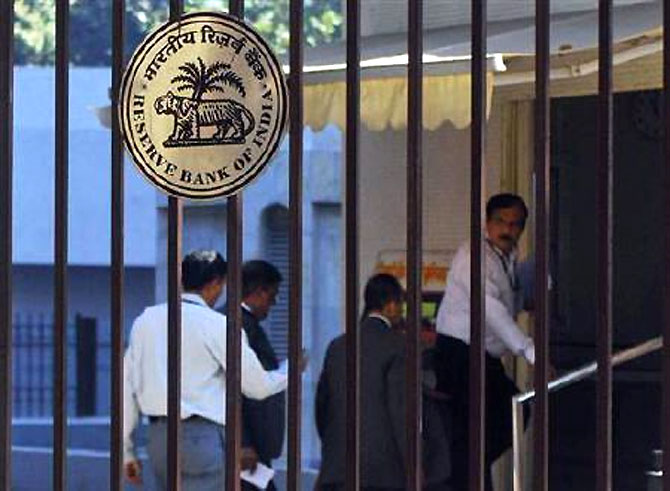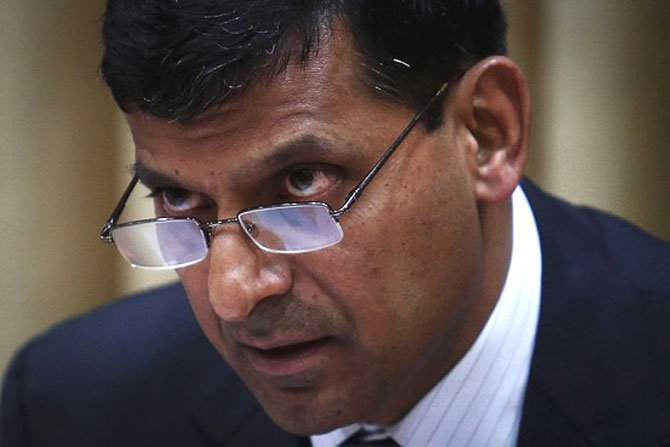Photographs: Reuters Devangshu Datta
The spurt in banking may be short-lived because of his limited options
The new Reserve Bank of India governor’s inaugural speech has been parsed to death by now. It made a very positive impression due to his fresh perspective. However, it is still worth considering the implications of what he said.
First, transparency and communication. This would be of massive service to anybody with an India-specific exposure. If the markets know what the RBI intends, or even believes that the RBI has coherent intentions, some of the volatility will ease.
It would make a welcome change from the central bank’s splendid imitation of a headless chicken in the past few months. The assurances that there will be no sudden knee-jerk tightening of liquidity, or attempts to prevent speculation by fiat, have been well received.
By delaying the next policy statement until after the US Fed meeting, he is being sensible. If the Fed does start tapering, the RBI will almost certainly have to hike policy rates. If the Fed holds off, the RBI gets some flexibility.
Sooner or later, the Fed will taper. US bond yields have more or less doubled in the past four months in anticipation. When tapering starts, the US dollar will harden some more.
India, along with every other Emerging Market, will have to raise rates in response. Higher rates will fit in with controlling domestic inflation and since Rajan is clearly focussed on inflation, he will kill two birds with one stone. However, the markets could be quite disappointed as and when he does hike.
Click on NEXT for more...
Why the Rajan rally will not continue
Photographs: Reuters
The RBI has also set a timeframe for granting new banking licenses by January. This is fantastic given its history of deferring such decisions by years. Similarly, allowing new branches without permission being sought every time, could help financial inclusion.
The proposal to push ahead on enabling mobile-based transactions, and on “white ATMs”, are also possible “game-changers”.
At the same time, the RBI will ease access to overseas capital and attempt to lower hedging costs. Raising the limits for overseas borrowing to 100 per cent of unimpaired Tier-1 capital, reworking the status of foreign banks, etc., are good ideas in theory. Swaps for FCNR at a rate of 3.5 per cent and hedges at 1 per cent discount, are big incentives for banks to raise financing abroad.
The central bank is gambling that this could add to reserves now, and once this crisis tides over, the rupee could be stronger when the time comes for unwinding swaps. If that happens, it will gain both ways. Of course, the RBI will take a hit if the rupee weakens even more over the long-term. However, even in that case, if these measures pull in say, $10 billion in this fiscal, the RBI will gladly pay the cost in 2016-2017.
The political establishment will not like interest rate hikes. But it will grin and bear it rather than let the rupee spiral down in uncontrolled fashion. Nor will there be opposition to raising cash abroad to boost reserves.
Click on NEXT for more...
Why the Rajan rally will not continue
Photographs: Danish Siddiqui/Reuters
Rajan will run into serious opposition if he does try to cut priority sector allocations ahead of elections. He has hinted at that, and also about putting tougher recovery and loan assessment measures in place.
The political establishment will fight tooth-and-nail to prevent this happening. Nor will politicians like the implications of cutting down on the enforced buying of government debt as Rajan has hinted he would like to gradually do.
The “gradual internationalisation” of the rupee as he termed it, is a move towards capital account convertibility. Dr Manmohan Singh promised this would happen, way back in 1993 when he was the Finance Minister.
He probably intended to keep that promise but things got in the way for the next 20 years. Those “things” may continue to interfere. Perhaps the development of a rupee-import arrangement with Iran for buying crude will ease this process of greater convertibility.
Net-net, Rajan will not manage to get all the things he wants, since some of them are likely to meet with entrenched opposition. But he will be able to get some things moving and whatever does get done will be an improvement. Some of what he wants will certainly not happen before a new government is installed.
The financial sector and the equity markets in general have responded with joy to the appointment. At some stage, when the Fed tapers, or even earlier, there will be a more sober reassessment. The fact is, India remains in a crisis. Banking in particular, and equities in general, will correct down again before there can be sustained recovery in asset values.





article